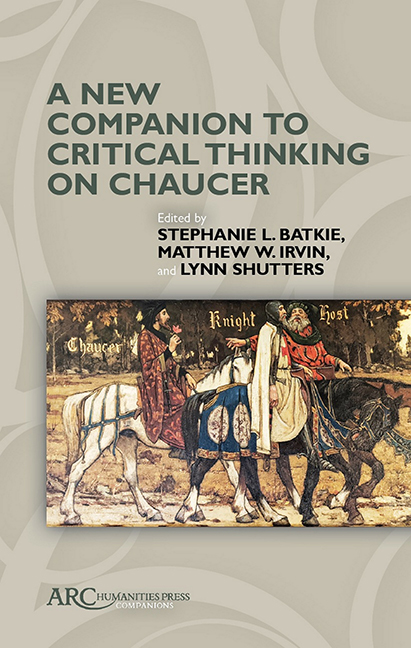Book contents
Entente
Published online by Cambridge University Press: 21 October 2021
Summary
Legend of Good Women
Troilus and Criseyde
Friar's Tale
Retraction
DESPITE BIOGRAPHER’S VALIANT efforts, our understanding of Geoffrey Chaucer's life is riddled with gaps. We have a series of life-records that point to the poet's activities throughout England and into Europe during the second half of the fourteenth century, and we have the literary works he authored. Over the centuries, biographers have taken his recorded activities and literary efforts, arranged them according to the latest understanding of the literary, cultural, and political backdrop of Chaucer's day, and then stitched all these elements together, sometimes with suppositions about Chaucer's intentions, sometimes with a silence that leaves the reader to infer those motives for themselves.
We see Chaucer's first biographer, Thomas Speght, harness the power of silence when he briefly remarks in his 1598 edition of Chaucer's Works that “Master Buckley did see a Record [from the Inner Temple], where Geoffrey Chaucer was fined two shillings for beating a Franciscane fryer [friar] in Fleetstreete.” In twenty words, this report gives us most of the basics—the Who, What, Where, How, and one of the Whys (Why was Chaucer fined two shillings?)—but remains silent on the other Why's we might ask. Why was that Franciscan friar on Fleet Street, where his destination could have ranged from law courts to brothels? Why did Chaucer beat that friar? Did the friar know why Chaucer was beating him? Did Chaucer know why the friar was on Fleet Street? Why was this offence worth a two-shilling fine? Why did Buckley mention this altercation and the consequent fine to Speght? We have no answer to these questions, nor do we have other contemporaneous accounts to help fill in the gaps.
Despite this documentary silence, we glimpse Speght's reasons for including this report in his biography by considering what the reported incident suggests about Chaucer. Not only did an affiliation with the Inner Temple confirm the poet's formal education, but the altercation with a friar corroborated what Speght and other post-Reformation readers saw as Chaucer's deep-seated antifraternalism, a disposition already evidenced by such characters as the pilgrim Friar Huberd (1.208–69) and the friar in the Summoner's Tale (3.1709–2294).
- Type
- Chapter
- Information
- A New Companion to Critical Thinking on Chaucer , pp. 43 - 58Publisher: Amsterdam University PressPrint publication year: 2021



